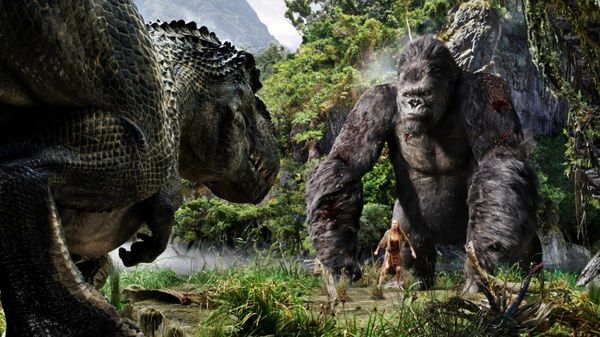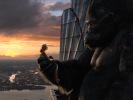Eye For Film >> Movies >> King Kong (2005) Film Review

New Zealand director Peter Jackson and his latest protagonist, the mighty Kong, sure have a lot in common. Both are hulking, hirsute figures who have long enjoyed cult status on their remote islands, both were discovered (along with their beautiful native habitats) by America's moving picture industry and became causes celebres when exhibited before a mass audience, and both have climbed to the very top, creating awesome spectacles along the way. Yet, where Kong's story ends in a tragic fall, Jackson continues to triumph.
King Kong reaps the benefits of Jackson's genuine fanboy affection for his material. The original film with Fay Wray has been Jackson's all-time favourite ever since he first saw it on television some 35 years ago and his obvious reverence for it ensures that this remake is a labour of love, rather than just a cynical exercise in revenue raking. When it became clear that he was going over budget, he ploughed $35 million of his own money into the project to avoid having to compromise his vision. It is the sort of monumental risk that could see the king of epic cinema topple, but judging by the vertigo-inducing heights attained by the final product, it is not likely to be a decision that he will come to regret. For Jackson's King Kong represents popular entertainment at its most sublime. Not only is it a marked improvement on RKO's charming, yet corny, original, it also stomps all over the more recent blockbusters, such as Jurassic Park, Godzilla and Titanic, all of which it openly apes.

In his 1976 remake, John Guillermin updated many elements of the plot, making the ship that captures Kong an oil tanker and having the destructive ape scale the Twin Towers in the finale. Such changes, had Jackson chosen to adopt them, would have brought an undeniable frisson in the post 9/11 context, but, instead, he has retained the original film's pre-war setting and story outline, including the iconic climax in which Kong swats at passing bi-planes atop the Empire State Building. Once again the expedition to Skull Island is led by a director, hoping to capture on film previously unseen exotica (in a sly reflection of the state-of-the-art filmmaking techniques that contributed to King Kong, both in 1933 and now, 72 years later), but Jackson and his co-writers have carefully skimmed much of the cheese from the original's characters and dialogue.
Naomi Watts radiates warmth and vulnerability, as the melancholic starlet Ann Darrow, and is far less passive than Wray in the original. Jack Driscoll (Adrien Brody) is no longer a dapper adventurer, vying with Kong for male supremacy, but a sensitive playwright who only reluctantly dons the hero's mantle. And Jack Black brings a welcome streak of self-doubt to the otherwise irredeemably exploitative director Carl Denham. These are 20th century characters subtly tweaked to have 21st century sensibilities, while Kong himself, mixing rage with tenderness and isolation with longing, is no less than a mirror to the ambivalent state of masculinity in the new millennium.
Like The Lord Of The Rings trilogy before it, King Kong shows off Jackson's prodigious talent for large-scale productions and his unmatched ability to blend live action characters seamlessly with special effects. He has digitally recreated a vast Depression-era New York City, as well as the dizzying fantasy terrains of Skull Island, and a whole host of blood curdling Darwinian cast-offs, from lumbering dinosaurs to out-sized bats to giant creepy crawlies. At the centre of all this is Kong himself, a gargantuan ape, combining motion-capture work from Andy "Gollum" Serkis, who also plays the unhygienic chef Lumpy, with realistically modelled gorilla gestures. In Kong, Jackson's technical crew has created a beast that is at once terrifying, magisterial, sympathetic and thoroughly believable, so that even the scenes between him and Ann, with all their potential for ridiculousness, prove deeply affecting. At the screening that I attended, critics (normally a hard-nosed bunch, not known for their sentiment) were openly weeping during the film's fateful final act.
Exciting, funny, frightening, romantic, nostalgic, moving and grimly fatalistic, King Kong races along, like its central character, with a speed and grace that utterly belies its great size. Alongside Braindead, here coyly referenced by a cage in the ship's hold marked Sumatran Rat Monkey, King Kong is Jackson's finest cinematic achievement and certainly king of the jungle amongst the big budget releases of 2005.
So, what are you waiting for? It is time once more to go ape.
Reviewed on: 09 Dec 2005


















